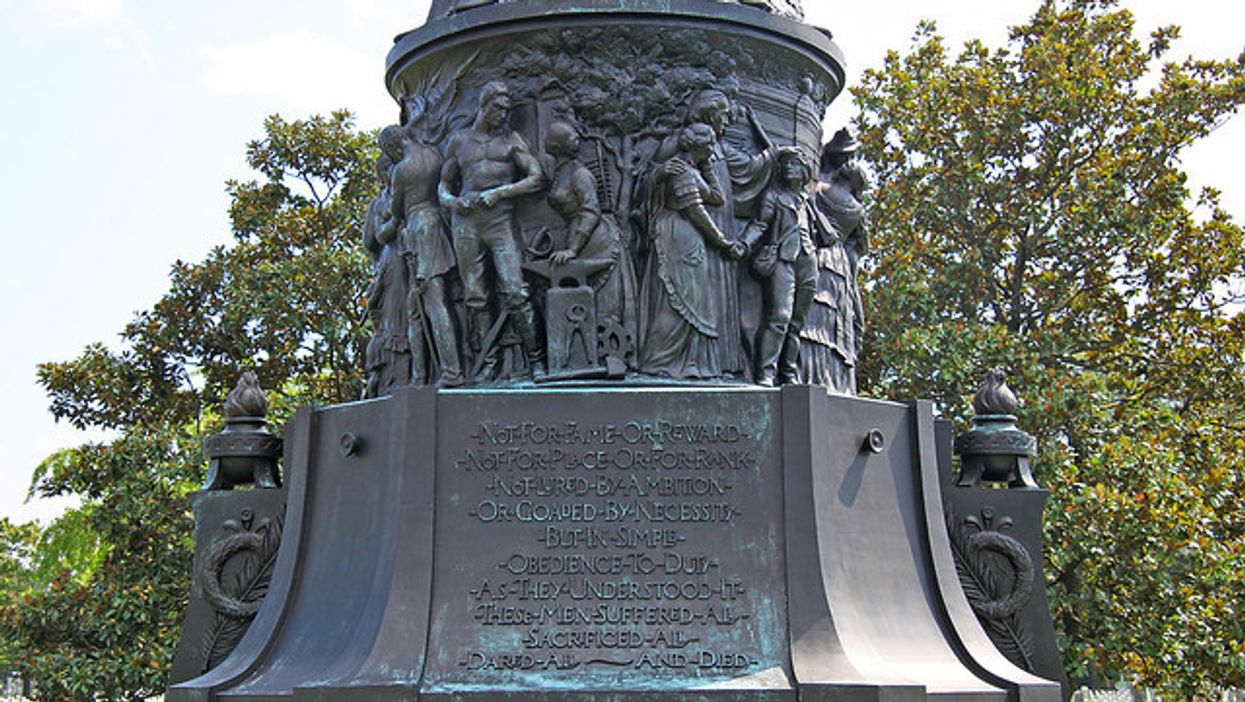Statues Come Down While Barriers To Truth Are Erected
Reprinted with permission from Roll Call
In Charlottesville, Va., where a Unite the Right gathering of neo-Nazis, white supremacists, Lost Cause devotees and other angry history deniers left destruction and death in their path in 2017, there was a different scene this past weekend.
The city removed statues of Confederate generals Robert E. Lee and Stonewall Jackson, memorials to those who fought on the losing side of a Civil War to maintain the brutal and murderous institution of slavery. They were erected as monuments to white supremacy, not in the 1860s but the 1920s, a Jim Crow threat to Black citizens to "know their place."
Now, as then, there are those opposed to this bit of progress, with arguments that removing the stone idols would mean erasing history, which is ridiculous since that history will never disappear from books, museums and tall tales handed down by the "never forget" brigade.
Ironically, many of these same folks would be only too glad to forget what really happened, during that bloody Civil War and in the 100 years after — the ingenious laws and policies that continue to reverberate through everything from health care to housing.
As part of the plan, they've come up with a fear-based campaign to, you got it, erase any part of American history that deals with racism and the ways it was intentionally embedded in American institutions. And predictably, this battle in a war that has never ended is actually gaining momentum that Republican politicians hope to ride to electoral victory.
The Ultimate Snowflakes
They could not do it without the cooperation of aggrieved parents fighting against something they haven't even tried to understand.
I really wish that instead of tying themselves into contradictory knots, these troops standing in the way of the truth — the ultimate snowflakes trying to "cancel" facts — would come clean and just admit that it's not history they're opposed to, it's any reckoning that gets in the way of their myths.
The version of history they love is what's been spoon-fed to many generations until fairly recently — propaganda in the name of patriotism. The concern "for the children" expressed in tear-stained testimony at school board meetings from Loudoun County, Va., to Chandler, Ariz., only extends to certain kids, their own. It leaves out the Black, brown, Asian American and Native American children who have suffered through and been traumatized by a white-washed tableau that either villainizes or disappears American heroes who always have been stalwart fighters for an inclusive and welcoming society, also known as America as it supposedly aspires to be.
There is no more absurd example than in Tennessee, where parents from "Moms for Liberty" don't want children to learn about what six-year-old Ruby Bridges endured when she integrated her New Orleans elementary school in 1960. The image of young Ruby immortalized by quintessential American artist Norman Rockwell depicts her daily walk surrounded by federal marshals. To get an education, her body and soul had to survive angry white parents, faces twisted, who greeted her with jeers, who threatened to poison her, who, when a child her age should have been playing with baby dolls, held up a coffin carrying a Black one so Ruby could get the message.
So, white children of today are too fragile to merely read about the dangerous racism a 6-year-old faced not that long ago? Do their parents realize they are still trying to bar Ruby Bridges from school?
A complaint is that Ruby's story needs more whites in shining armor.
Well, there were a few, including Barbara Henry, a white teacher from Massachusetts, who did the job she was paid to do for the year Ruby was in a class all her own. And there are the parents who eventually sent their children back to get an education, in more ways than one.
The star of her story, though, is Ruby, someone any child should admire. She never cried or whimpered, said federal marshal Charles Burks. "She just marched along like a little soldier." A former first lady, Eleanor Roosevelt, wrote her a letter.
An argument brought up again and again in these curriculum fights is that teaching stories like Ruby's causes children of color to think of themselves as victims. The opposite is true. Ruby, at 66, is still an activist, as well as a wife and mother. Ruby Bridges Goes to School: My True Story, her book that parents are so afraid of, teaches lessons of resilience and strength that transcend color. The message she continues to share: "I tell children to be kind to each other."
Oh, the horror!
Beyond The Classroom
Children wrongly taught that America was and has always been perfect, presumably grow into the fragile flowers that Sen. Tom Cotton believes need protecting when they enter the military. In the manner of the thought police in Russia or China, the Arkansas Republican is trying to get an instructor at the U.S. Air Force Academy fired for teaching about systemic racism that shaped all-American institutions, like the military.
Does Cotton not know that African Americans fought for the right to fight and die for a country that enslaved them, discriminated against them, segregated them into separate units until 1948?
Was Cotton not taught of the Japanese Americans who fought in World War II — including in one of the most decorated regiments in the country's history — while family members back home were herded into internment camps, suspect only because of their race and ethnicity?
That made their sacrifice more patriotic, with their numbers in service still strong. Though they lack representation at the top, about 43 percent of the 1.3 million men and women on active duty in the United States military are people of color.
People of color in America know, have always known about, injustice, just as six-year-old Ruby learned. Being clear-eyed about how the country falls short of its ideals only hardens the determination to right those wrongs.
And, in truth, it's not just students of color whose lives continue to be affected by systemic racism. In a Texas school, a white teacher gave white students permission to use the "N-word." In California, a high school basketball team had its title taken away for throwing tortillas at members of the opposing, predominantly Latino team at a postgame "celebration."
All children, as well as adults who should know better, have learned only too well lessons about the country's power divide, about who counts and who does not.
When you hide history, a price will be paid. Esther Bejarano knew. The Auschwitz survivor, who used the power of music to fight anti-Semitism and racism in postwar Germany, died recently at the age of 96. She used to tell the young people: "You're not guilty of what happened back then. But you become guilty if you refuse to listen to what happened."
When I study the pictures of those everyday Americans spewing hate at a 6-year-old and then the faces of angry parents and politicians, so insistent on burying the truth, my wish is that they listen, then look in a mirror.
Mary C. Curtis has worked at The New York Times, The Baltimore Sun, The Charlotte Observer, as national correspondent for Politics Daily, and is a senior facilitator with The OpEd Project. Follow her on Twitter @mcurtisnc3.












